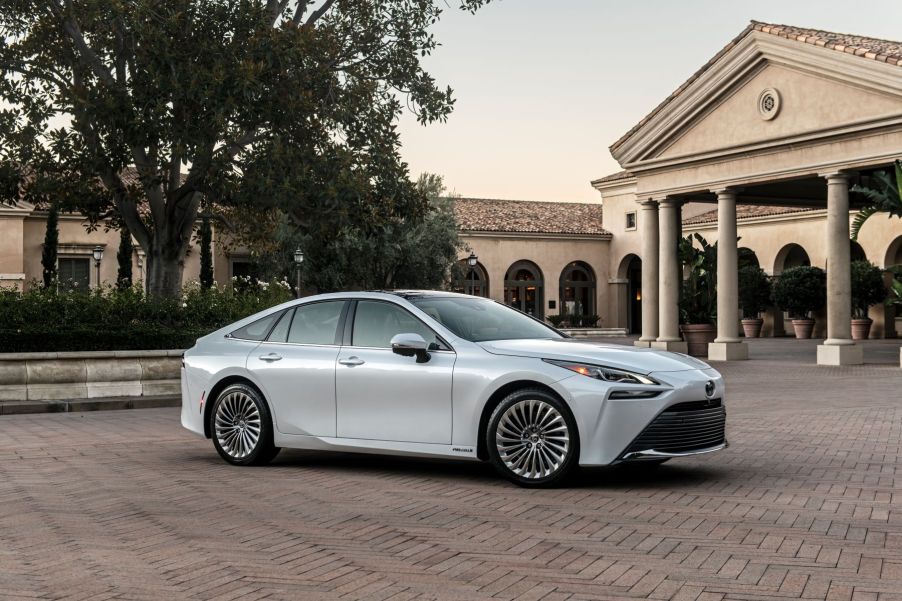
Does the 2022 Toyota Mirai Limited Accomplish Anything Useful With Its $66K Price Tag?
Electric vehicles (EVs) are certainly all the rage these days. However, they aren’t the only clean energy vehicles on the market. Some automakers are investing in hydrogen fuel cell electric vehicles (FCEVs) in the hopes that consumers will be attracted by the promise of clean energy vehicles with faster fueling times and longer ranges. However, FCEVs face many of the same challenges EVs faced at the onset and continue to face. So, one may wonder what FCEVs currently available on the market like the Toyota Mirai Limited are really accomplishing from a sustainability perspective. Furthermore, is something like the 2022 Toyota Mirai Limited worth its premium price?
The hydrogen fuel cell vehicle market

While hydrogen fuel cell vehicles promise better efficiency and range than EVs, they also face the challenge of limited fueling infrastructure. A look at hydrogen and fuel cell data across the country provided by Hydrogen Fuel Cell Nexus shows that only a few states have sufficient supply infrastructure to support hydrogen fuel cell vehicles.
In fact, because hydrogen and fuel cell suppliers are predominantly located in larger coastal cities and states, the Toyota Mirai is only sold in California. Given California’s air pollution issues and emissions standards, there’s greater FCEV infrastructure and greater consumer awareness of and interest in hydrogen-powered vehicles (and EVs as well).
As one of the wealthiest states in the nation, California also has many high-income enclaves. Those wealthy neighborhoods and counties further make the state an attractive market for hydrogen fuel cell vehicle manufacturers. Emissions-free or not, hydrogen fuel cell technology is expensive and substantially inflates the price of FCEVs.
What’s included with the Toyota Mirai Limited?
Toyota is known for manufacturing quality cars, so the Mirai is worth a look based on the brand’s strength alone. However, with a starting MSRP of $49,500 for the base XLE trim and a whopping $66,000 for the Limited trim, as per Toyota, budget-conscious shoppers may think twice.
Price notwithstanding, there’s a lot to like about the Toyota Mirai, starting with its sleek and curvy exterior. Car and Driver reviewers note the Mirai provides a stable, refined, and powerful ride, courtesy of its 182 hp-generating electric motor and RWD platform.
While it takes 9.1 seconds to hit 60 mph, its relative sluggishness is outweighed by its impressive range of up to 402 miles. And as per Toyota, the Mirai XLE enjoys a fuel economy of 76/71 MPGe city/highway, while the Limited trim’s rating falls to 67/64 MPGe due to its added convenience features. However, both models sport impressive sets of numbers that can dramatically reduce the Mirai’s cost of ownership.
An upscale interior in both the XLE and Limited helps begin to justify their high MSRP. However, the premium amenities really shine on the Limited – features like a moonroof, three-zone climate control, and heated and ventilated seating. A 12.3-inch touchscreen, 14 speaker JBL sound system, and built-in navigation don’t hurt either.
Is the Toyota Mirai a success or a dud?
The Toyota Mirai is an excellent vehicle from a design, performance, comfort, and features perspective, whether you choose the XLE or the Limited trim level. Additionally, not only does the Mirai offer significant range and a charging time of just 5 minutes, but Toyota is also offering an incentive to new buyers or lessees that may alleviate the sticker shock. Those who buy or lease a new Toyota Mirai XLE or Limited will receive up to $15,000 of complimentary hydrogen.
However, despite an attractive package, the Mirai may not be able to overcome warranted consumer skepticism. The price is relatively high for a sedan. Furthermore, for those who desire an emissions-free vehicle, the Mirai lacks the cachet of the cheaper and much faster Tesla Model 3.
Perhaps the biggest drawback is that it’s only sold in California, one of the few states with the infrastructure to support it. There’s no home fueling system commercially available for hydrogen refueling, and if you read about hydrogen fuel cell vehicles on Quora and other places, you’ll learn how dangerous a DIY-FCEV-fueling setup can be.
You won’t be taking cross-country trips in the Mirai, at least not yet. Additionally, if you prioritize design and performance over clean energy, for almost half the Limited’s price, you could get a Car and Driver‘s Editor’s Choice award-winning Honda Civic Type-R or a few other similar sedans with supercar-like performance. Still, if the Mirai is a glimpse at the future of clean energy vehicles, and you’re a California resident with a spare $66,000, the Mirai Limited is worthy of consideration today.


